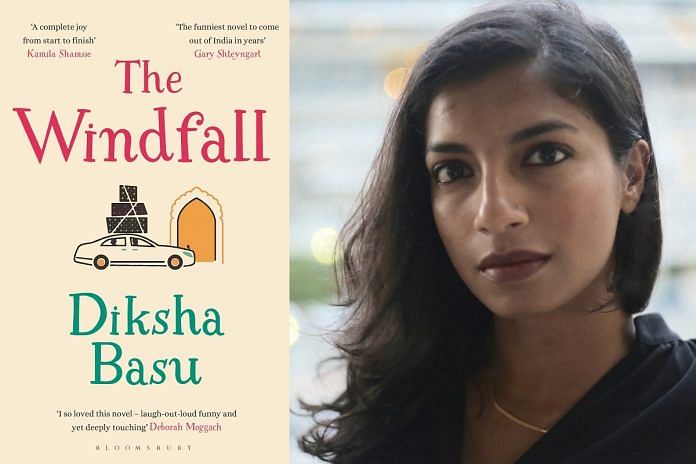The Windfall tells the story of a middle class family suddenly coming into money, but it remains stuck in the quagmire of stereotypes.
Diksha Basu’s ‘The Windfall’ (Bloomsbury, 2017) is, for the most part, not an idyllic novel. Opening with the soon-to-emerge transition of the Jha family from modest housing complex Mayur Palli to the posh avenues of Gurgaon, it tells the story of a self-made man. It is a story of social mobility, of the opulence of Delhi’s minority, of French cuisine and imported blended scotch.
The book features some well-phrased and genuinely witty shifting narratives, focussing on Mr and Mrs Jha, their son Rupak, the Chopras of Gurgaon, and Mrs Ray, a widowed friend of Mrs Jha. However, the book fails spectacularly due to its inability to analyse properly the paradigm shift that money may possibly bring for a middle class family.
Mr Jha rises to monetary decadence by selling his website to an American company, much too cheap by his son Rupak’s estimate, and much too luckily according to his neighbours. He does what he believes all rich people in India do, buy a Mercedes and invest in Swarovksi-bedazzled sofas. The entire purpose of his newly-acquired wealth is exhibition.
His wife, who displays keen rationality and has the ability to make practical decisions in tough times, is sidelined as a fading voice in the background. There is nostalgia in her erratically-placed narrative for a life full of simpler pleasures.
The book attempts to analyse certain social stigmas and customs, ranging from widowhood of a young woman to materialism. There are snippets about arranged marriages and a fetishisation of religion lacking due diligence, which come across as random musings instead of informed perspectives.
Everything in the book, from characters to objects, are nothing but commodities. Mrs Ray’s chances of happiness – despite being widowed young – are dependent (or so it seems) on her “stunning features”.
Mr Jha, on the other hand, finds himself in a new world where failure is celebrated and indulgence is the norm. Among the scattered gold objects on the floor of his neighbour’s Mr Chopra’s house are the remnants of his relationship with his wife and his son. His son, a former hardworking student who didn’t fit in with the private school crowd, finds himself expelled for possessing drugs at a school abroad. The book soon morphs into a fable that warns –money brings with it drugs and failure.
The female characters in the novel have little or no agency in shaping their own fortunes. There is an unbridled dependence on men to make decisions for the family. Even Mrs Ray, who has the opportunity to be a bold widow, finds the noose of reputation and decorum bound so tight around her neck that she has to make excuses for buying herself a bottle of liquor. Social surveillance is a consistently-addressed trope in the novel, whether it is in Mayur Palli or in the endless landscape of Gurgaon.
In both cases, expectations are defined by class, showing a parochial approach on part of the author towards variation within a given sample set. While the middle class participates in the patriarchal oppression of widows, the upper classes only seem to revel in parties and dinners. A more nuanced approach towards depicting the social stratification within Delhi would have come a long way in enriching the reader’s experience of ‘The Windfall’.
The book doesn’t end up doing justice to either. It makes caricatures of characters who, with their fascination with wealth and what it can do, surely belong in the cinematic experience of the Yash Raj/Dharma school. The only character that comes to life is money, and that has definitely been paraded well with an exquisite amount of detail, whether it be at the dinner scene at Lodhi Garden, or the bottles of wine from New Zealand.
Diksha Basu’s prose lacks the bite and depth that one may expect of a social satire. Basu lacks the ingenuity that could have made her book both insightful and amusing. She just ends up reiterating the notion that people who are not born into money can never be a part of high society.
The author is a research scholar in English literature at the University of Delhi.
‘The Windfall’ by Diksha Basu has been published by Bloomsbury India



